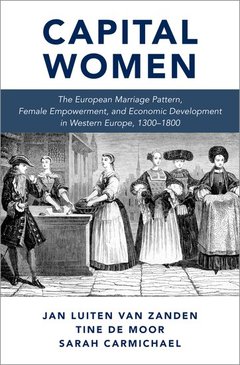Capital Women The European Marriage Pattern, Female Empowerment and Economic Development in Western Europe 1300-1800
Langue : Anglais
Auteurs : Zanden Jan Luiten van, Carmichael Sarah, Moor Tine De

How women increasingly became economic agents in early modern Europe is the focus of this stimulating book, which highlights how female agency was crucial for understanding the development of the Western European economy and sheds light on economic development today. Jan Luiten van Zanden, Tine De Moor and Sarah Carmichael argue that over centuries a "European Marriage Pattern" developed, characterized by high numbers of singles among men and women, high marriage ages among men and women, and neolocality, where the couple forms a new nuclear household and did not co-reside with the parents of either bride or groom. This was due to the influence of the Catholic Church's teachings of marriage based on consensus, the rise of labor markets, and institutions concerning property transfers between generations that enhanced wage labor by women. Over time an unprecedented demographic regime was created and embedded in a highly commercial environment in which households interacted frequently with labor, capital and commodity markets. This was one of the main causes of the gradual move away from a Malthusian state towards an economy able to generate long-term economic growth. The authors explore how the pattern was influenced by and influenced female human capital formation, access to the capital market, and participation in the labor market. They use numerous measures of economic activity, including the unique "Girlpower-Index" that measures the average age at first marriage of women minus the spousal age gap, with higher absolute age at marriage and lower spousal age gap both indicating greater female agency and autonomy. The book also examines how this measure can increase understanding of contemporary dynamics of women and the economy. The authors thus shed light on the degree to which women are allowed to play an influential role in and on the economy and society, which varies greatly from one society to another.
Jan Luiten van Zanden is professor of Global Economic History at Utrecht University. His research interests focus on the reconstruction and explanation of long-term trajectories in the world economy with the goal of understanding the deep roots of contemporary societal problems. Tine De Moor is professor of Institutions for Collective Action in historical perspective at Utrecht University. She is closely engaged with translating insights from the study of collectively managed institutions in the past to help organisations working in the present. Sarah Carmichael is an Assistant Professor in the economic and social history group of Utrecht University. Her research focuses on devising historical measures of gender inequality and exploring how family organization impacts upon the position of women.
Date de parution : 04-2019
Ouvrage de 288 p.
16.5x24.2 cm
Thème de Capital Women :
© 2024 LAVOISIER S.A.S.
